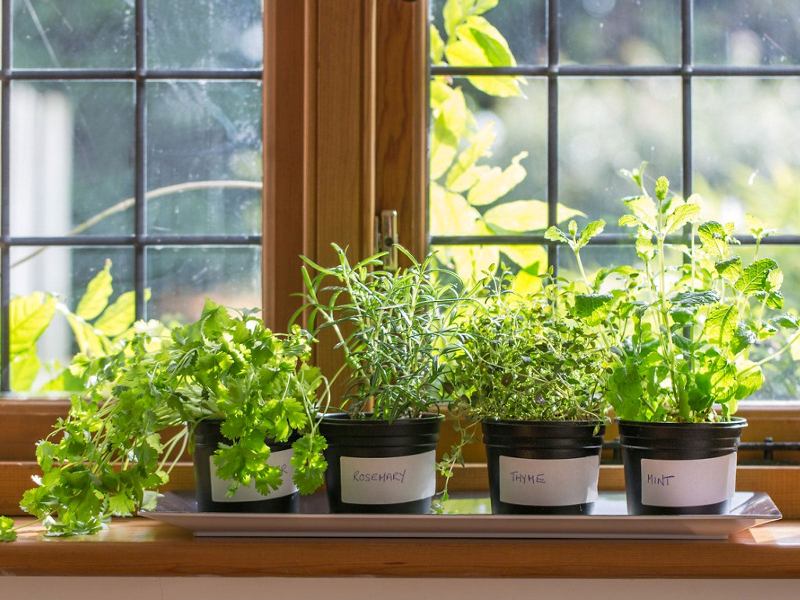How to Grow an Indoor Herb Garden

Adding plants to your home looks great, but growing an indoor herb garden can do so much more. Everything you need to know before you start.
I know living in a city can be a dull sight at times. But when someone who grows plants in an apartment window or in a small alleyway sees green, you can’t help but smile. Not all of us have a large backyard or front yard to grow our lovely plants, but there are plenty of ways to do so in a small space. If you have enough space in one small container, that’s enough for a lovely combination of herbs.
Herb gardening for a small space
Let’s take a look at the different types of herbs that can be planted in a small space, as well as several possible ways to plant them. If space is limited, you can see them growing indoors or on a balcony, patio or windowsill. Wherever you decide to grow your herb garden, keep lighting, accessibility, and climate in mind. When planning your garden, consider the herbs you use every day, the time and space you need to care for, and the herbs that grow in your space. For example, if you have little or no sunlight, you need to find herbs that will thrive without it.
If you don’t wait for them to wither, make sure you have plenty of time to water and care for your indoor herb garden. Natural sunlight along with fresh air is best for most herbs. Windowsills and balconies are the best places for an herb garden.
ideal courage
If you decide to grow an indoor herb garden in a small space, you should carefully consider the other containers you will use, but primarily look at those that drain well. For this, you will need a plate, unless you constantly wet the entire area. If your pots don’t have drainage holes, you can place a few stones and rocks at the bottom before adding soil. Mix vermiculite and soil to help with better drainage.
The pots should be checked daily to prevent the herbs from drying out. To test them, stick your finger in the soil. When dry, add water. If you find that your herbs are constantly dry, you may be draining too much.
Indoor pots of different sizes and shapes are very versatile. Before shopping for a pot, it’s best to measure your area to make sure everything fits.
Alternatively, there are many that can be used as pots. For example, you can use old plastic containers, cold drink bottles, glass bowls, or even baskets placed around the house. But think about multiples of each of these options. Your local nursery can tell you how much space each herb needs to fully mature, and this should be taken into account when planting your herbs.
You can use a glass bottle or tin placed on the windowsill, or even mount it to a board on the wall. Make or buy a pot hanger to hang herbs from your kitchen ceiling. One interesting thing I saw on the window was the use of teacups and saucers for various herbs.
Uses of Herbs
Hard, easily growing herbs should be considered. Also, pay attention to how you want to use the plant. Otherwise, you will have plants for aesthetics. Not only does the herb look good, it has many uses in culinary and natural medicine. Here are some good herbs:
Basil: Dried, this herb can add a delicate flavor to any meal. It can also be used to soothe coughs, chew fresh leaves or make basil tea to relieve headaches or indigestion.
Rosemary: This herb is suitable for cooking chicken and other algae. It can also be used to fight disease and get rid of dandruff.
Lavender: Use this herb in salads to add color and flavor. It is also known to promote sleep and deep relaxation when used in tea.
Thyme: Best used in a variety of pasta dishes, beans, and fish, this herb is very healthy and is known to promote overall health.
Mint: Add this herb to salads, pasta, or other dishes for a basically fresh taste. It is ideal to use tea to calm nerves, relieve nausea, and headaches, and calm the stomach.
Sage: An herb to add when making salads, fish, chicken or pizza. It has many great health benefits, but it also improves brain function.
Most herbs should or should not be harvested until the plants are fully grown. Your local nursery can provide detailed information on how long each herb takes to mature.
When purchasing herbs, ask the nursery for the amount of each herb, the amount of water, sunlight, etc. Living in an apartment, townhouse, etc. doesn’t stop you from having an herb garden. Plant a variety of herbs in the space you are in and enjoy the fruits of your labor.
Indoor herbal gardening isn’t for everyone, but you’ll never know unless you try. You can actually enjoy it!
